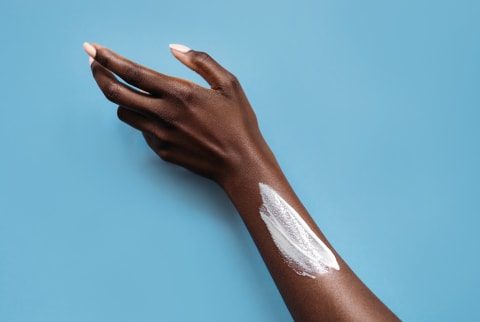Advertisement
Skin Care Is No Longer Just Topicals — The Science Of Cellular Beauty


For so long, skin care only meant topicals. You'd walk into a department store, hoping to find a cream or lotion that would brighten tone, smooth texture, and keep you at least temporarily hydrated. Beauty brands promised near-miraculous results with their tinctures (some actually delivered). But all in all, if you wanted to beautify yourself, you had one avenue: what you slathered on your face.
Slowly and over time, however, we have started realizing that what we eat and how we treat our body deeply affects our skin quality—after years of traditional dermatologists scoffing at the idea that our diets might be triggering skin woes, like breakouts. It started with budding research connecting certain foods (dairy1 and high-glycemic-index ones2) with acne and other inflammatory skin conditions. Then the research started ramping up in a major way. Now researchers are finding just how strong the gut-skin connection actually was3. Currently, the gut-skin connection continues to be an area of expanding research, with new studies being released constantly.
From there, it was an explosion of skin-healthy programs, cookbooks, and recipes—all promising glowing skin. It is, of course, a step in the right direction: connecting what's internal with what's external, and understanding we can support our overall skin quality by treating our bodies better.
Then came an increased interest in supplements: According to market data from Grand View Research, the global dietary supplements market size was estimated at $115.06 billion in 2018. From there it is expected to expand at a compound annual growth rate of 7.8% until at least 2025. "Rising health concerns along with changing lifestyles and diets has surged the product demand," the report stated. Supplements are, of course, not just beauty- and skin-related: There are many, many reasons you might take one. But according to market data researchers Euromonitor International, beauty-positioned supplements increased by 61% in 2018 in the U.S.—clearly, it's a growing interest.
The next step? The science is getting highly sophisticated. Instead of the more general idea that your well-being is connected to beauty, we are homing in on the exact mechanisms in the body that will support optimal cellular function, to promote healthy aging and overall good skin quality.*
Take mindbodygreen's nr+ for example. It promotes cellular energy production, glowing skin, and reduces the size of wrinkles.* It does so with its innovative formula of phytoceramides, astaxanthin, rhodiola, betaine, and—as the name suggests—nicotinamide riboside (NR).
The latter is a newly discovered form of vitamin B34 and a precursor to NAD+. NAD+ is a coenzyme found in all living cells and plays a vital role in maintaining proper cell functioning. However, our natural levels of NAD+ decline as we age5. Only recently have scientists begun discovering how to support those levels in a more targeted way.* Enter, NR. According to functional medicine pioneer Robert Rountree M.D., “if you raise NAD+, you basically promote a vital, healthy aging process, which is a huge thing*. I think nicotinamide riboside is an incredibly promising compound that most people haven't heard about.”
But the supplement also includes those healthy-skin actives.* Phytoceramides help combat dryness and wrinkles while significantly improving skin hydration, elasticity, and smoothness.* Astaxanthin is has potent antioxidant properties, which helps maintain the skin's collagen layer and has been shown to help reduce fine lines and age spots and support skin hydration.* Rhodiola has antioxidant properties that promote healthy aging.*
It's not just the supplement market that's getting cellular, either. Injectables are going the way of inside-out beauty, too. Instead of foreign fillers and neurotoxins, you can now opt for plasma-rich platelet (PRP) injections: Doctors and derms can take a vial of your blood, spin it in a centrifuge to separate the plasma and other cells, then inject them back into your skin. Since plasma is a healing cell, the all-natural fluid works to repair damage at and around the injection site, revealing healthier skin for months to come. And, finally, as beauty products get highly personal—with serums customized down to your skin's unique moisture levels and pH—don't be surprised if we come full circle: Topicals, too, might go the way of cellular optimization.
Beauty really is from the inside out.
If you are pregnant, breastfeeding, or taking medications, consult with your doctor before starting a supplement routine. It is always optimal to consult with a health care provider when considering what supplements are right for you.